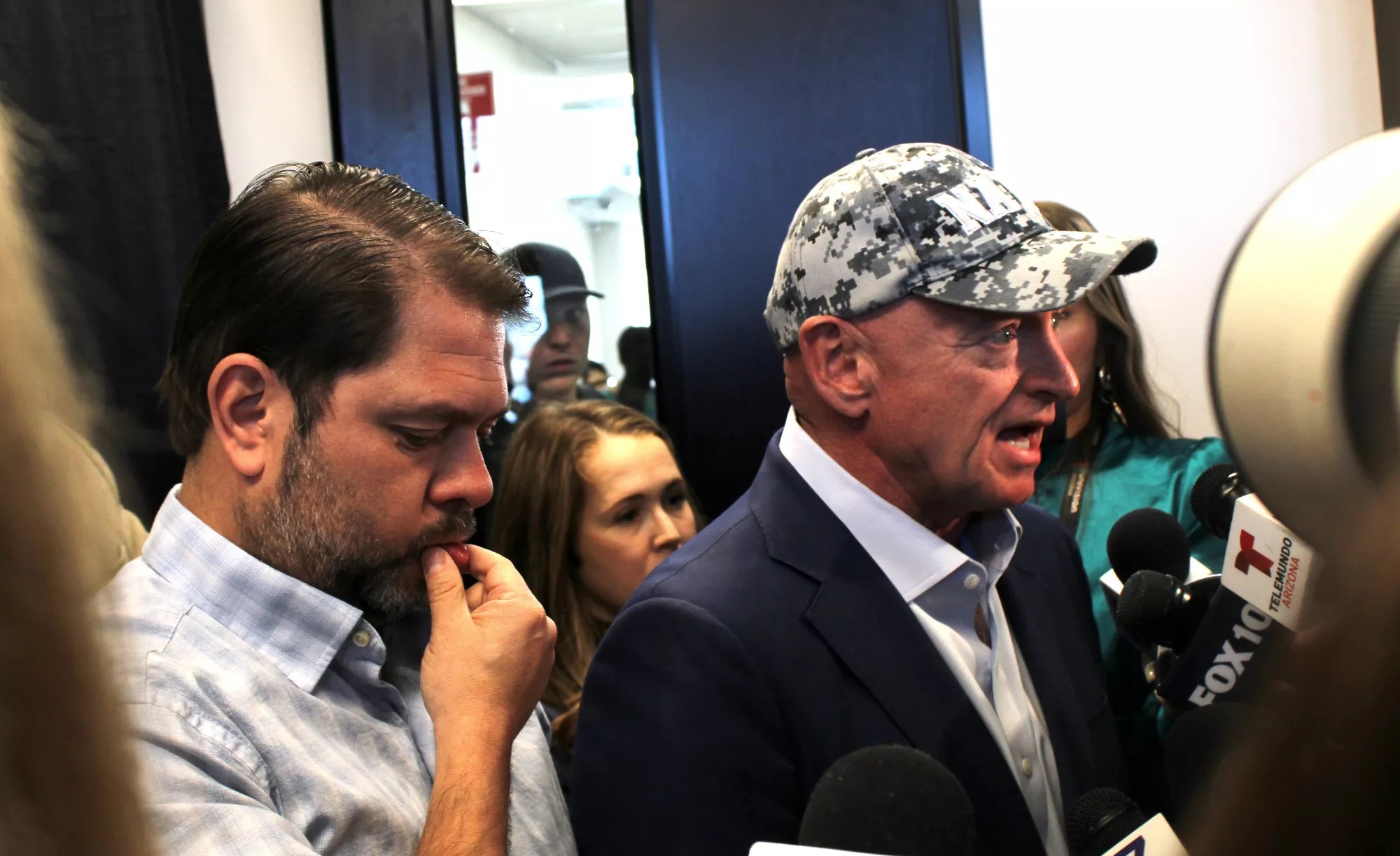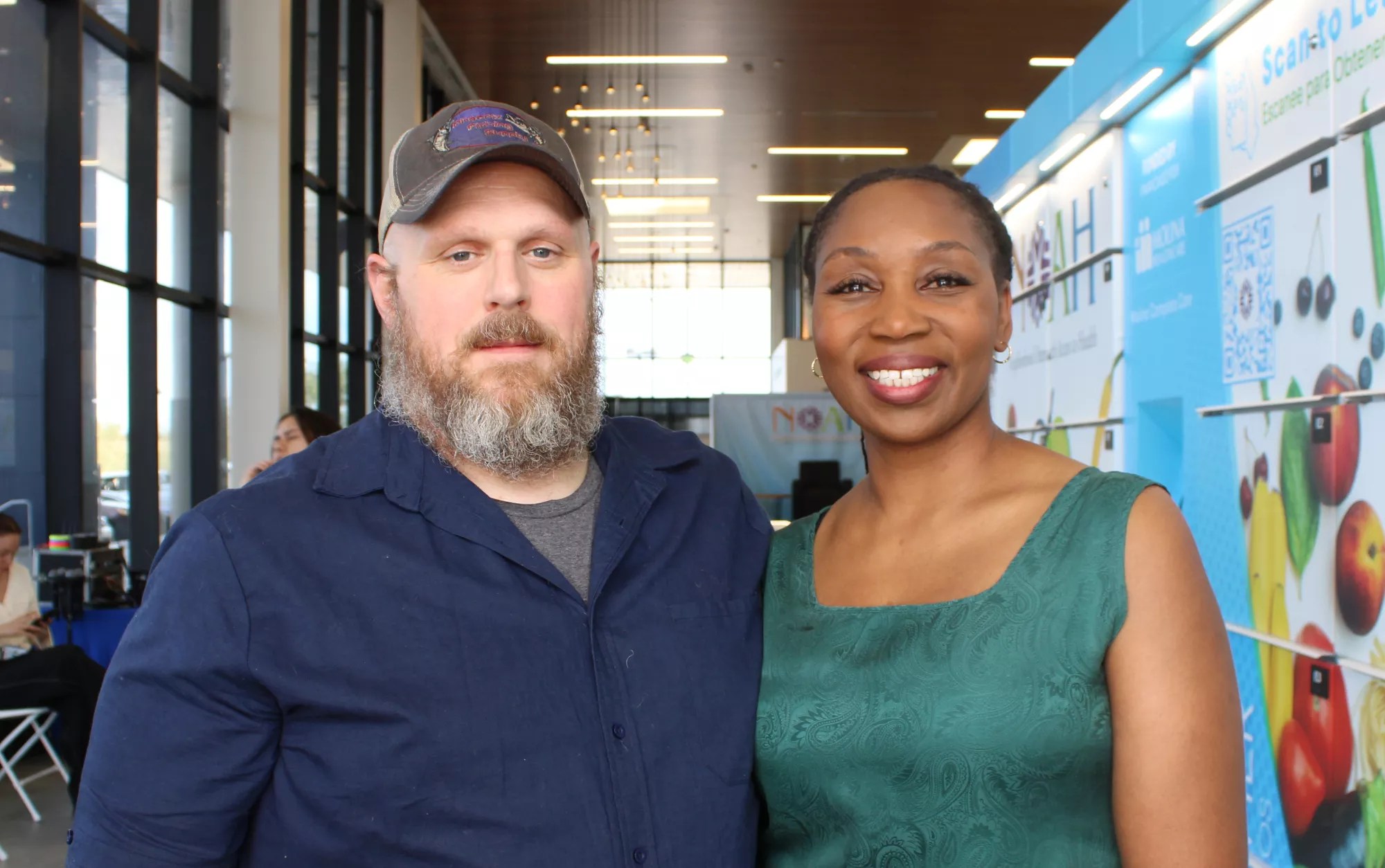
Morgan Fischer

Audio By Carbonatix
Standing in a back corner with her husband on Monday afternoon, Quianna Brown waited for a roaming microphone to make its way to her.
The Phoenix resident had come to speak to Arizona’s two Democratic senators, Mark Kelly and Ruben Gallego, who had called this town hall to talk about possible Republican-pushed cuts to Medicaid. More than 100 people had packed the first floor of the NOAH Cholla Health Center in Scottsdale, all of them eager to share their concerns and fears. When it was Brown’s turn to speak, the tension in her voice was palpable.
She and her husband, Joe Wiskur, have three adopted children. Her middle child, 10-year-old Lilah, had special needs. Lilah has a rare form of diabetes, Brown explained to the lawmakers, and she had to fight to get her treatment covered by Medicaid, which guarantees health care subsidies for children adopted out of foster care with needs like Lilah’s.
And now Republicans and President Donald Trump were working to advance a budget proposal that includes $880 billion in cuts from the health care and energy sections, a number so big it would require drastic cuts to Medicaid. Without it, Brown and Wiskur would be unable to afford Lilah’s treatments.
“Would you mind telling your colleagues in Washington that when they’re burning down this house, there are people still inside?” Brown asked the two senators, her voice trembling. “My kid is inside.”
Thank you for showing up and telling your stories. We’re in this fight with you pic.twitter.com/GLZNazJ7gG
— Senator Ruben Gallego (@SenRubenGallego) March 17, 2025
Supportive applause erupted.
“I’m 100% going to take that back to my Republican colleagues,” Kelly responded.
Kelly and Gallego hosted the event to broadcast warnings just like Brown’s. Cutting Medicaid, which provides health insurance to low-income residents, will have drastic consequences for families and for entire regions of Arizona.
Families could lose the ability to pay for necessary treatment. Hospitals and community health centers across the Grand Canyon State that rely on funding from the program – such as the one that hosted the senators’ event – could close.
“Medicaid is the foundation of our health care system in Arizona,” Kelly told the crowd. “You kick 700,000 people off of Medicaid, that means those resources from the federal government aren’t going to be here anymore and places like this close down. Hospitals are going to have to cut staff.”

Joe Wiskur and Quianna Brown spoke at a town hall about possible cuts to Medicaid.
Morgan Fischer
‘Make them fear the voter’
Medicaid is an especially important resource in rural – and politically red – Arizona, where health care options aren’t as plentiful. Those that exist rely on Medicaid to operate, and the loss of even a fraction of them would further strain the system. Instead of driving 10-20 minutes to a local health clinic or hospital, Medicaid recipients will have to trek further. Some will delay care rather than make the trip. Those who delay care when they shouldn’t could end up in already-strained emergency rooms.
“We can see a future where a lot of rural Arizona is going to be driving even further and further distances,” Gallego told attendees. “Imagine having to drive for hours to see your loved one because they couldn’t get basic emergency care.”
Without Democratic majorities in either the Senate or House of Representatives, there are few levers Kelly or Gallego can pull to stop Trump and Republicans from doing further damage. Instead, they raised the alarm, encouraging their audience to pressure the lawmakers who have leverage but lack the will to do something.
Keep your foot on the gas, Kelly and Gallego preached. Let them know you’ll remember this. Protest, send letters and call your representative’s office. Kelly highlighted three who could stand to get a few voicemails: Arizona Republican congressmen David Schweikert, Abe Hamadeh and Andy Biggs.
“You have to make them fear the voter more than they fear Trump,” Gallego said. “Maybe they don’t care about people dying, but maybe they care about their own jobs.”
In the meantime, families like Brown’s and Wiskur’s are already bracing for the worst. Shortly after Trump’s inauguration, they were warned by their daughter’s health care providers about possible cutbacks to Medicaid. They were advised to create an itemized list of the most important services Lilah needs.
Paying for Lilah’s treatment out of pocket would not be feasible. “We just wouldn’t be able to do it,” Brown told Phoenix New Times after the town hall. Right now, neither they nor their child’s doctors know what will happen.
“Even right now, they don’t know what’s going to happen and how bad it’s going to be. All they know is it’s gonna get cut,” Wiskur said. “There’s a storm coming, and all you can do is prepare.”